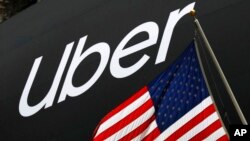ບາງທີມັນອາດຈະບໍ່ສາມາດເອີ້ນໄດ້ຢ່າງຄັກແນ່ເທື່ອວ່າ ແມ່ນອູເບີ້ເພື່ອຕ້ານກັບການກໍ່ອາຊະຍາກຳ.
ແຕ່ນັ້ນແມ່ນພາລະກິດຂອງປວງຊົນທີ່ສຳຄັນ ໃນເວລານີ້ ຂອງບໍລິສັດອູເບີ້ ຢູ່ໃນ
ຫວຽດນາມທີ່ເອີ້ນວ່າ Grab Inc. ໄດ້ເຊັນໃນບົດບັນທຶກຄວາມເຂົ້າໃຈເພື່ອໃຫ້ການຮ່ວມມືກັບຕຳຫຼວດ ໃນປະເທດເອເຊຍຕາເວັນອອກສຽງໃຕ້ດັ່ງກ່າວ.
ພາຍໃຕ້ບົດບັນທຶກ ຊຶ່ງມີການປະກາດໃນວັນຈັນວານນີ້ ຕຳຫຼວດທີ່ນະຄອນໂຮຈິມິນ ຈະໃຫ້ການຝຶກອົບຮົມໃນການປ້ອງກັນໂຕຈແລະກົດໝາຍອາຍາຕໍ່ພວກຄົນ
ຂັບລົດ ໃນຂະນະທີ່ບໍລິສັດ Grab Inc. ຈະໃຫ້ການສຶກສາແກ່ພວກຄົນຂັບລົດ
ເພື່ອໃຫ້ຮູ້ຈັກ ກ່ຽວກັບຮ່ອງຮອຍໃນການກະທຳຜິດຕ່າງໆ ແລະລາຍງານໃຫ້ຕຳຫຼວດຊາບ.
ການຮ່ວມມືດັ່ງກ່າວນີ້ໄດ້ພາໃຫ້ເກີດຄຳຖາມກ່ຽວກັບວ່າແມ່ນຫຍັງຄືເລື້ອງສ່ວນໂຕແລະແມ່ນຫຍັງຄືຄວາມປອດໄພສາທາລະນະ ຕະຫຼອດທັງບົດບາດທີ່ເໝາະສົມຂອງບໍລິສັດເອກກະຊົນຫຼືສ່ວນບຸກຄົນເມື່ອເວົ້າເຖິງຄວາມພະຍາຍາມໃນການສອດສ່ອງດູແລ.
ທ່ານແຈຣີ ລິມ (Jerry Lim) ຜູ້ອຳນວຍການຂອງບໍລິສັດ Grab Inc. ກ່າວວ່າ “ພວກເຮົາຮູ້ສຶກເປັນກຽດທີ່ໄດ້ເຮັດວຽກຮ່ວມກັບກົມຕຳຫຼວດ ເພື່ອປະກອບ
ສ່ວນຢ່າງຕັ້ງໜ້າເຂົ້າໃນການປາບປາມອາຊະຍາກຳ ແລະເຮັດໃຫ້ຊີວິດຂອງປະ
ຊາຊົນທຸກໆຄົນປອດໄພຕື່ມຂຶ້ນໃນແຕ່ລະມື້. ການຮ່ວມມືລະຫວ່າງສອງຝ່າຍບໍ່ພຽງແຕ່ຈະຄ້ຳປະກັນໃນຄວາມເປັນລະບຽບຮຽບຮ້ອຍແລະຄວາມປອດໄພຢູ່ໃນ
ສັງຄົມທໍ່ນັ້ນ ແຕ່ຍັງຈະປົກປ້ອງຄວາມປອດໄພຂອງພະນັກງານຂັບລົດ Grab Inc. ແລະພວກລູກຄ້ານຳດ້ວຍ.
ບົດບັນທຶກຄວາມເຂົ້າໃຈ ສະບັບນີ້ ຍັງໄດ້ຈັດຕັ້ງສາຍດ່ວນ 24 ຊົ່ວໂມງ ລະຫວ່າງຕຳຫຼວດແລະບໍລິສັດ Grab Inc. ແລະບໍລິສັດດັ່ງກ່າວຍັງໄດ້ຊື້ທຸລະກິດ ຂອງບໍລິສັດຄູ່ແຂ່ງຢູ່ໃນຫວຽດນາມເມື່ອປີກາຍນີ້.
ອ່ານຂ່າວນີ້ເພີ້ມເປັນພາສາອັງກິດ
It probably cannot quite be called the Uber for crime fighting.
But that is the main public service mission now that the Uber of Southeast Asia, Grab Inc, has signed a memorandum of understanding to cooperate with the Vietnamese police.
Under the MOU (Memorandom of Understanding), announced on Monday, the police in Ho Chi Minh City will provide training in self defense and criminal law to drivers, while Grab Inc. will also provide education so its drivers should know how to look out for signs of criminal behavior and report it to the police.
The cooperation raises questions about the line between personal privacy and public safety, as well as about the appropriate role for a private company or private individual in terms of policing efforts.
"We are honored to work together with the Police Department to actively contribute to the fight against crime and make the lives of every citizen safer day by day," Jerry Lim, the director of Grab Vietnam, said. "The coordination between the two parties not only contributes to ensure order and security in society but also protects the safety of Grab's driver partners and customers."
The MOU also establishes a 24 hour hotline between the police and Grab Inc., a startup that bought out rival Uber's business in Southeast Asia last year. This comes after the alleged homicide of a Grab driver by two young men in the capital city of Hanoi. News of the alleged crime has attracted widespread attention and raised concerns of public safety.
There is also some relevance in the new California law that Uber Technologies Inc., Lyft Inc., and other companies in the gig economy must recognize workers as employees with benefits, and not as independent contractors. While Grab Inc. is not covered by the California law, the ride hailing company has also emphasized that its drivers are not full time employees. That would make it unclear as to whether under the law it can require its drivers in Ho Chi Minh City to partake in the public safety training.
Grab competes with Go-Viet, Be, and FastGo in Vietnam's ride hailing sector.
Besides self defense moves, the training is meant to teach drivers how to identify potentially dangerous situations and common methods or tricks used by criminals. Motorbike taxi and car drivers are also supposed to learn the protocol to quickly report to the police if they suspect a possible threat to someone's life, health, safety, or personal property.
This does not address situations in which it is the driver himself or herself who may commit the crime against a customer. It also could create a slippery slope, as it is not always clear what can be perceived as a crime. The customer could see a case as his own private behavior in a car, while a driver could see it as suspicious behavior.
Unlike in neighboring China, Vietnam does not have the same kind of mass surveillance. The MOU does not mean ride hailing drivers are an extension of law enforcement. Grab Inc. described the cooperation with the police as an example of the people participating in the movement to protect homeland security. Under the cooperation there is more responsibility on the individual, as drivers may have to defend themselves in dangerous circumstances or look out for criminal behavior.
So that more drivers can know the law and principles of self defense, this training could spread around Vietnam in the future.
"In parallel with the development of services, we also aim to make transportation safer for customers and drivers by constantly improving. safety standards in the field of transport in general," Lim said. He added, "We hope that the cooperation between the two sides will create an important foundation to be able to spread throughout the country in the near future."





